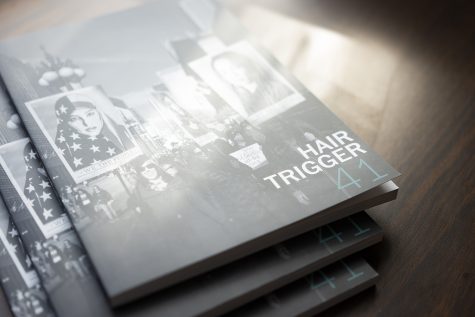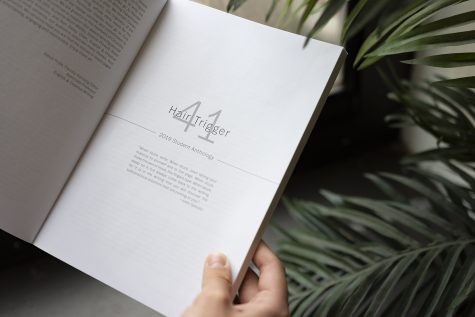Award-winning literary publication Hair Trigger pulls away from print
October 24, 2019

Hair Trigger, a student-edited anthology of short fiction and nonfiction student works first went online in 2016 with the introduction of Hair Trigger 2.0, a digital companion to the print publication.
Forty-one years of thumbing through stimulating storytelling, empowering narratives and illuminating images in the award-winning Hair Trigger magazine will soon be over. The Gold-Medalist 41st edition of Columbia’s student-produced literary publication Hair Trigger will be the last issue available in print.
Hair Trigger, a student-edited anthology of short fiction and nonfiction student works, first went online in 2016 with the introduction of Hair Trigger 2.0, a digital companion to the print publication.
However, due to budget cuts, the publication will be strictly online going forward, making the 41st issue its last in print, said Alexis Pride, faculty adviser for Hair Trigger and associate professor in the English and Creative Writing Department.
Upcoming issues will be smaller, but more frequent, with nine student pieces published in each quarterly edition, said Cora Jacobs, managing editor of Hair Trigger and Columbia’s other creative literary magazines, Punctuate and the Columbia Poetry Review.
Jacobs, who teaches the “Literary Magazine Production” course for Hair Trigger, said this will be an opportunity to add up-to-date content to Hair Trigger that a static yearly print edition could not traditionally support, such as book reviews, interviews and, potentially, special feature articles.
Jacobs said social media, especially Instagram, will be another major component of the digital Hair Trigger.
Though Hair Trigger readers will have more to read, they won’t be able to hold it in their hands, smell the ink and hear the turn of pages, said Eric May, an associate professor in the English and
Creative Writing Department. He said the physical magazine is a great piece to hand to prospective students, and is also great for students to put in their portfolio.

The publication will be strictly online going forward, making the 41st issue its last in print.
But having an online presence is not all bad, May said, as it will allow the publication to reach more eyes. “When something is online, the whole world is your audience,” he said.
Ben Peachey, Hair Trigger’s assistant managing editor in the “Literary Magazine Production” course, said the change may impact readers as well. Peachey, a senior fiction and music double major, said the sense of satisfaction that comes from working through a large, printed anthology start to finish may be lost once it goes online.
At the same time, Peachey said he is looking forward to the opportunity to be able to more easily share his and other students’ work via the new online platform.
Overall, Pride said she does not foresee a sacrifice to quality in moving the magazine online because students will continue to contribute great work to the publication. Instead, she said the new format may allow for more submissions from students.
“You can’t know what makes strong writing unless you yourself have performed at that level,” Pride said. “And [the students] demonstrate that again and again.”
One of those students is Carolyn Boykin, a first-time contributor to Hair Trigger and MFA candidate studying creative writing. Boykin, who was also a submissions editor for Hair Trigger 41, said her experience brought her an opportunity to think like an editor while writing her own stories.
Boykin was the 2019 recipient of Hair Trigger’s David Friedman Memorial Award, a $500 cash prize given each year to the best story or essay published in the magazine. Her creative nonfiction piece, “Ugly,” took nearly a year to write and was named the best of the 41st edition after a vote was held among Hair Trigger editors and staff.
The story explores parts of her youth she had never written or talked about before, she said.
The piece Boykin submitted for the next edition of Hair Trigger is much different than her first, but she feels that difference is celebrated by the magazine.
“[Columbia] exposes you to so many different things,” she said.







